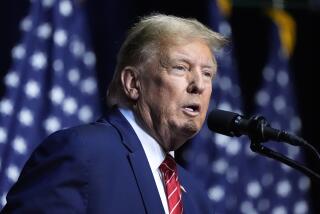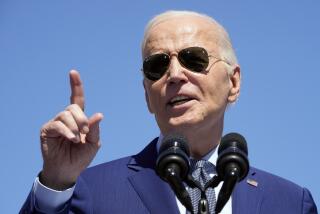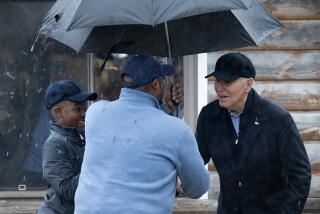In Wisconsin, Obama touts goals and seeks to sway voters
When President Obama took to Wisconsin to sell the ideas in his State of the Union speech, he had an equally important mission: to recapture the state and try to restore his electoral viability.
In Wisconsin, like in other states that propelled his 2008 presidential victory, voters are concerned about the economy, rising federal deficits and the president’s healthcare plan, according to strategists from both parties.
Even though the state’s unemployment rate is a comparatively mild 7.5% — the national rate is 9.4% — voters harshly punished Obama’s party in the midterm elections. Republicans won a U.S. Senate seat, captured the governor’s office, picked up both houses of the state Legislature and won a majority of the state’s congressional delegation.
“There’s almost not a living state Democratic office holder left after that; I exaggerate slightly,” said Charles Franklin, a political science professor at the University of Wisconsin in Madison.
As a result, Wisconsin has become a familiar stop on Obama’s itinerary. Wednesday’s trip was his seventh appearance there since taking office.
Had Obama been on the ballot in Wisconsin last year, he might have had a tough time himself. In 2008 he beat his Republican opponent, Sen. John McCain of Arizona, by 14 points. But one survey of Wisconsin voters last month showed Obama with just a 4-point lead — nearly within the margin of error — over former Massachusetts Gov. Mitt Romney, one possible opponent in the 2012 race.
Inside the White House, aides want Obama’s 2012 coalition to resemble the one that elected him by a comfortable margin in ’08. They want him to be as competitive as possible in the swing states he carried that year, including Virginia, North Carolina, Ohio and Wisconsin.
“No matter how you slice the data, Wisconsin is going to end up being one of those critical Midwestern swing states in 2012,” said Franklin. “If, two years from now, Obama is in danger of losing Wisconsin, then he has horrible problems throughout the Midwest.”
The president’s trip came as new projections by the Congressional Budget Office showed an increase in the federal deficit, to a record $1.5 trillion this year from $1.4 trillion in earlier forecasts. The increase, a result of last month’s tax-cut deal between Republicans and the White House, was expected. But the report also said the unemployment rate would remain above 9% through this year, dropping to 8.2% in 2012, when Obama will be up for reelection.
Nonetheless, as he traveled through Wisconsin, Obama tried to make the most of his visit, visiting renewable energy plants and delivering the message that the U.S. must churn out innovators and entrepreneurs if it is to keep its dominant spot in the world economy.
“We need to win the future,” Obama said at one stop, stressing the importance of education. “We’ve got to be more productive, more capable, more skilled than any workers on Earth.”
The president played up the Super Bowl-bound Green Bay Packers’ victory Sunday over his hometown Chicago Bears.
He joked with the crowd at Orion Energy Systems that, within an hour of his arrival, he’d been handed three Packers jerseys, including one signed by team star Charles Woodson.
“Sunday was a tough day for Bears fans,” said Obama, a Chicagoan, of the NFC championship game.
A conventional notion is that Obama’s political troubles are rooted in the fragile economy. Nationally, polls show the economy is the overriding worry and that Obama could lose in 2012 unless the job numbers perk up.
Yet Wisconsin voters seem driven by competing concerns. Republicans gained ground in the midterm elections by arguing that Obama’s policies were fueling the deficit and that his healthcare plan was a dangerous government overreach, state strategists said.
Wayne Bigelow, chairman of the Dane County Democratic Party, faulted Democrats for failing to explain their policies.
“The Democrats didn’t do a good job of marketing the healthcare plan. Most people didn’t know exactly how they were going to benefit from it,” he said. “People were confused. They didn’t know how it was going to help them; they didn’t know who was eligible.”
But the state’s new U.S. senator, Republican Ron Johnson, said in an interview that Wisconsin residents are concerned about federal spending.
“The people of Wisconsin are incredibly concerned with the out-of-control level of spending and debt,” said Johnson, who ousted incumbent Democrat Russell D. Feingold in November. “We realize that this is simply unsustainable. So I believe that unless [Obama] changes course and gets that message and begins to rein in the size and scope of the federal government, he’ll have problems in Wisconsin.”
At the White House, a retooling is underway. Obama has made overt moves to the center since the midterm election debacle, the latest being his promise in the State of the Union address to freeze non-security discretionary spending for five years. He also threatened to veto any bill that contains “earmarks,” the pet spending projects that lawmakers pass with little scrutiny.
Beyond the policy shifts, Obama is hoping a little personal attention makes a difference. Past presidential races here have been decided by the thinnest of margins.
In 2004, Democrat John F. Kerry edged out George W. Bush, 50% to 49%, to win the state. Four years earlier, Democrat Al Gore beat Bush in Wisconsin by less than 1 percentage point.
“I’m always surprised that [Obama] spends so much time here,” said Bill Kraus, a Republican strategist based in Madison. “We’re a small state — purple, rather than red or blue — but he seems to have some affection for us.”
As well as for its Super Bowl-bound football team.
“In the spirit of sportsmanship, I wish you good luck in the Super Bowl,” Obama told Wisconsin residents at one of his stops.
Lisa Mascaro in the Washington bureau contributed to this report.
More to Read
Start your day right
Sign up for Essential California for news, features and recommendations from the L.A. Times and beyond in your inbox six days a week.
You may occasionally receive promotional content from the Los Angeles Times.






